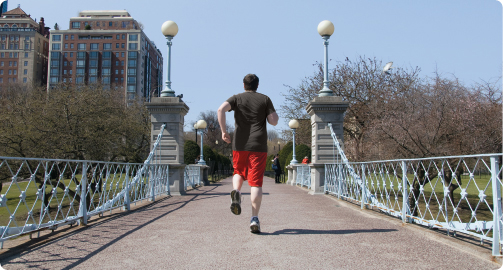Diet and Exercise
There is a clear connection between what you eat and drink, your overall health and well-being, and stress. Eating a lot of junk food will add pounds to your body and reduce your energy level. In addition, when you can’t keep up with your work because you’re sluggish or tired, you might experience more stress. One dietary substance that can be directly linked to higher stress levels is caffeine.
Is This You?
Have you put on a little weight since you started college? Are you struggling to make the right decisions about what to eat? Have you found that fitting exercise into your daily schedule is nearly impossible? Look at some nutrition and exercise strategies. Which of these strategies are you willing to try? Pick one of each and chart your progress for a week. Are you willing to keep it up for a second week? What about incorporating a second strategy?
In moderate amounts (50 to 200 milligrams per day), caffeine increases alertness and reduces feelings of fatigue, but even at this low dosage it can make you perkier during part of the day and more tired later. Consumed in larger quantities, caffeine can cause nervousness, headaches, irritability, stomach irritation, and insomnia, which are all symptoms of stress. Many people who have heart conditions have been told to avoid caffeine because it tends to speed up heart rates. How much caffeine do you consume? Total your caffeine intake on the basis of the figures in Table 13.1.
| Coffee (8-oz cup) |
|---|
| Regular 277
(brewed, generic): 95–200 mg |
| McDonald’s (regular brewed) (16 oz): 100 mg |
| Starbucks latte (16 oz): 150 mg |
| Decaffeinated (brewed, generic): 2-12 mg |
| Espresso (1 oz): 40-75 mg |
| Tea (8-oz cup) |
| Brewed, black, steeped: 14–61 mg |
| Brewed, black, decaf: 1–12 mg |
| Green tea: 24–40 mg |
| Lipton Brisk Lemon Iced Tea: 5–7 mg |
| AriZona Iced Tea (lemon, 8 oz): 11 mg |
| Soft drinks and energy drinks (12-oz serving unless noted otherwise) |
| 5-Hour Energy (2 oz/60 mL): 207 mg |
| 7UP: 0 mg |
| Coca-Cola Classic: 30–35 mg |
| Coca-Cola Zero: 35 mg |
| Cran-Energy (8 oz): 70 mg |
| Diet Coke: 38–47 mg |
| Diet Pepsi: 27–37 mg |
| Dr. Pepper: 36 mg |
| Full Throttle (16 oz): 144 mg |
| Monster Energy (16 oz): 160 mg |
| Mountain Dew: 46–55 mg |
| Red Bull (8.4 oz/250 mL): 80 mg |
| Rockstar Energy Drink (16 oz): 160 mg |
| Sprite: 0 mg |
| Other products: |
| Chocolate bar: 6–20 mg |
| Hershey’s Chocolate bar: (approx.1.5 oz): 9 mg |
| Hershey’s Dark Chocolate Bar (approx. 1.5 oz): 18 mg |
| Caffeine gum (2 pieces): 115 mg |
| Over-the-counter drugs |
| NoDoz (maximum strength, 1 tablet): 200 mg |
| Excedrin (extra strength, 2 tablets): 130 mg |
| Midol (2 tablets): 65 mg |
|
Note: Ranges indicate variation in the amount of caffeine due to differences in brewing, grinding, and roasting. |
|
Source: Most information on caffeine content is taken from http://www.mayoclinic.com/health/caffeine/AN01211. |
If the amount of caffeine that you consume is excessive (which will vary with individuals, so monitor such things as inability to sleep and when you are most alert and most tired), consider drinking water in place of caffeinated drinks. You can also choose decaffeinated coffee or a caffeine-free soft drink.
Exercise is an excellent stress-management technique, the best way to stay fit, and a critical element of any worthwhile weight loss program. Although any kind of recreation benefits your body and spirit, aerobic exercise is the best for stress management as well as weight management. In aerobic exercise you work until your pulse is in a “target zone” and keep it in this zone for at least 30 minutes. You can reach your target heart rate through a variety of exercises: walking, jogging, running, swimming, biking, or using a stair climber. What makes the exercise aerobic is the intensity of your activity. Choose activities that you enjoy so you will look forward to your exercise time. That way, it’s more likely to become a regular part of your routine.
Besides doing wonders for your body, aerobic exercise keeps your mind healthy. When you do aerobic exercise, your body produces hormones called beta-endorphins. These natural narcotics cause feelings of contentment and happiness and help manage anxiety and depression. Your mood and general sense of competence improve with regular aerobic exercise. In fact, people who undertake aerobic exercise report more energy, less stress, better sleep, weight loss, and an improved self-image.
Think about ways to combine activities and use your time efficiently. Maybe you could leave the car at home and jog to class. Try going to the gym with a friend and asking each other study questions as you work out on treadmills. Park at the far end of the lot and walk to classes. Take the stairs whenever possible. Remember that exercise does not have to be a chore. Find something that you enjoy doing, and make it part of your daily schedule. Many campuses have recreation departments that offer activities such as intramural sports, rock climbing, aerobics classes, and much more. The most important things about exercise are to stay active and make it part of your day-to-day life. A wealth of online fitness resources are available, as well as resources for nutrition and general health and wellness. The Tech Tip in this chapter can help you navigate them.
